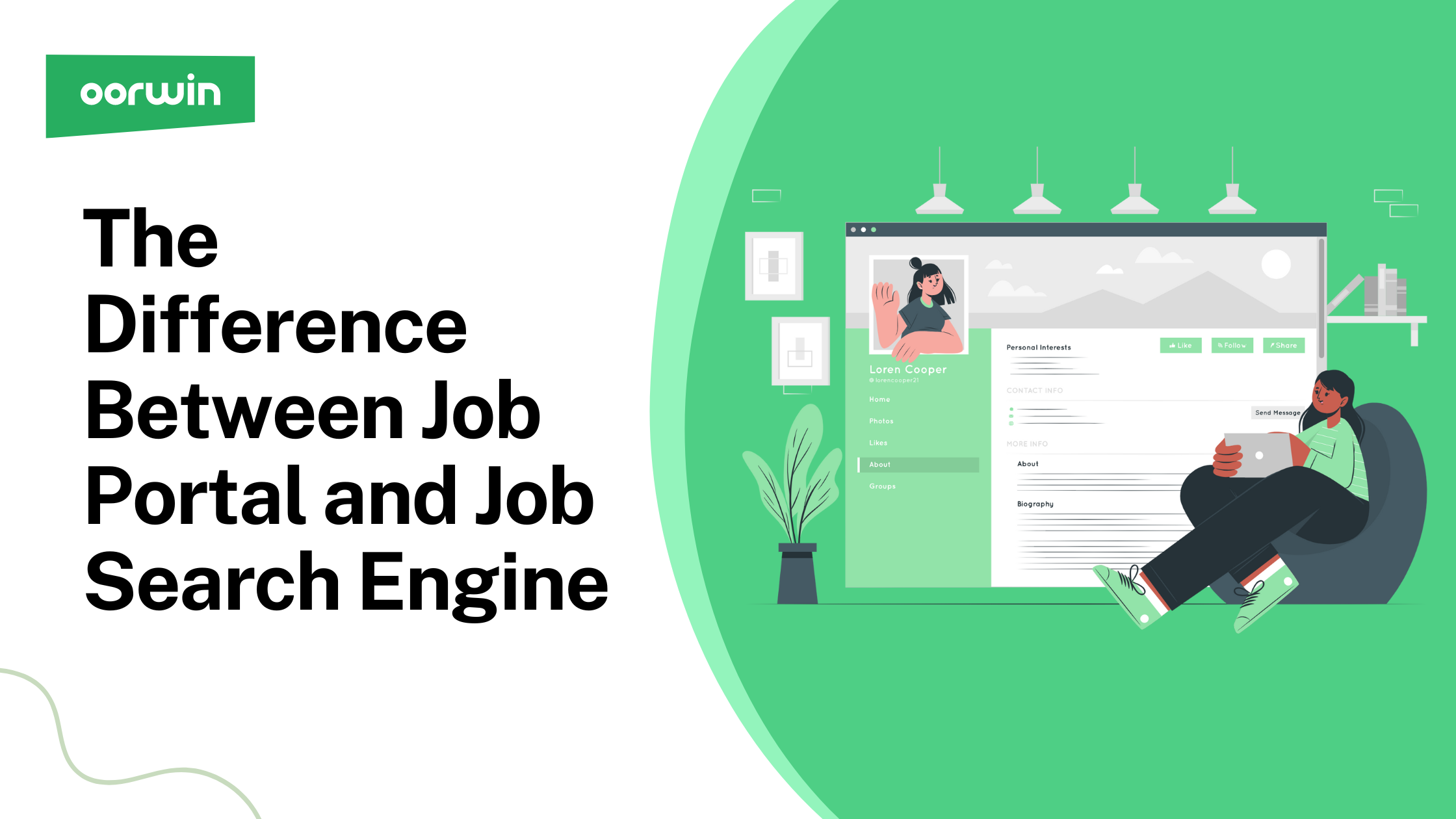The Difference Between Job Portal and Job Search Engine
Oorwin
10min read / 31 Jul 2023

Related Articles
Job Portal vs. Job Search Engine: An Overview
Job portals and Job Search engines are vital tools for job seekers and employers. While both platforms assist in finding job opportunities, they differ in functionality and purpose. Understanding the unique features and benefits of each can significantly impact job search success. In this comprehensive overview, let’s explore the key aspects of job portals and job search engines.
Understanding Job Portals
Job portals are online platforms that provide a gateway to job opportunities from specific companies and industries. These platforms offer job seekers a personalized experience, allowing them to create user profiles, directly interact with employers, and access curated job listings tailored to their preferences. Job portals provide valuable tools, such as resume builders and career resources, making them essential for those seeking targeted job searches and seamless application processes.
Key Features of Job Portals
- User profiles for personalized job searches: Job portals allow candidates to create customized user profiles, where they can input their skills, qualifications, and job preferences.
- Direct interaction with employers through applications: Job portals facilitate direct communication between candidates and employers. Job seekers can apply for jobs through the portal, submitting their resumes to recruiters and streamlining the application process.
- Curated job listings from specific companies or industries: Job portals often partner with specific companies or industries, providing curated job listings that match the platform’s focus. This specialization ensures that job seekers can access relevant opportunities from reputable employers, enhancing the quality of job listings.
- Additional features like resume builders and career resources: To support candidates in their job search, many job portals offer features such as resume builders, interview tips, and career resources. These tools help candidates craft professional resumes and improve their interview skills.
Understanding Job Search Engines
Job search engines are powerful online platforms that aggregate job listings from various sources, providing job seekers with a comprehensive database of opportunities. These engines offer a broad and diverse range of job options covering multiple industries and locations. With real-time updates and advanced search filters, job search engines enable candidates to conduct extensive and efficient job searches, making them valuable tools for those seeking quick access to a vast job market.
Key Features of Job Search Engines
- Aggregated listings from various job boards and websites: Job search engines collect job postings from multiple sources, including job boards, company websites, and career pages, aggregating them into one centralized database. This ensures that candidates can access various job opportunities from multiple platforms.
- Broad job searches covering diverse industries and locations: Job search engines enable candidates to conduct broad job searches, covering multiple industries, job titles, and locations. This breadth of options allows job seekers to explore opportunities beyond specific companies or industries.
- Real-time updates for new job postings: Job search engines continuously update their databases with new job postings as they become available. This real-time feature ensures that candidates have access to the latest job opportunities.
- Advanced search filters for precise customization: To facilitate focused searches, job search engines offer advanced filters that allow candidates to customize their search based on specific criteria. These filters include job type, location, salary range, experience level, and other relevant parameters to match individual preferences.
Comparing Job Portals and Job Search Engines: A Detailed Analysis
Job portals and job search engines are two distinct approaches to job hunting. Exploring their differences aids job seekers in selecting the most effective platform for their needs.
Database Vs. Aggregator
Job portals have a dedicated database presenting exclusive job listings from specific companies or industries. These curated listings ensure higher job quality and relevant opportunities. Job search engines function as aggregators, collecting job postings from various sources, requiring more thorough scrutiny from job seekers.
User Experience and Flexibility
Job portals provide a personalized user experience, allowing candidates to create profiles, apply directly to jobs, and interact with employers. This customized approach enhances user engagement and communication. Job search engines offer more flexibility by aggregating diverse job listings from various sources, providing candidates with multiple options. Direct interaction with employers may be limited.
Interaction with Employers
Job portals facilitate direct communication between candidates and employers, enabling applicants to apply directly through the platform. This direct interaction streamlines the application process and allows candidates to showcase their interests and suitability for specific roles. On the other hand, job search engines often redirect candidates to the original job postings on external websites, reducing direct interaction opportunities with employers.
Job Listing Quality
Job portals typically offer curated job listings from reputable companies and industries, ensuring high-quality opportunities for candidates. The curated approach ensures that job seekers are presented with relevant and reliable job postings, enhancing the overall job search experience. In contrast, job search engines aggregate job listings from various sources, which may lead to duplicates or outdated postings, requiring candidates to assess the listing quality carefully.
When to Use Job Portals vs. Job Search Engines
Knowing when to utilize job portals or search engines can significantly impact a job search. Understanding their strengths helps job seekers optimize their job-hunting strategy for the best results.
Job Portals for Industry-Specific Searches
Job portals are ideal for candidates seeking targeted opportunities in specific industries or companies. These platforms focus on curated job listings, exclusively presenting opportunities from particular sectors. Job seekers looking for specialized roles or niche industries can benefit from job portals’ personalized approach, ensuring they find relevant job options that align closely with their skills and career aspirations.
Job Search Engines for Broad and Quick Searches
Job search engines are well-suited for candidates conducting broad job searches across various industries and locations. With their ability to aggregate job listings from multiple sources, these engines offer many opportunities in a single platform. This makes job search engines an efficient option for those seeking quick access to a vast job market with diverse job options.
Maximizing Your Job Search: Tips for Using Job Portals and Search Engines Effectively
Optimizing your job search with valuable tips can help you effectively utilize job portals and search engines to find the perfect job opportunity for your career goals.
Utilizing Advanced Search Features
To enhance your job search, leverage the advanced search features on job portals and search engines. To customize your search, utilize filters for job type, location, salary range, and experience level. This helps you discover relevant opportunities and saves time by focusing on precisely what aligns with your preferences and qualifications.
Keeping Profiles Updated
Maintaining up-to-date and comprehensive profiles on job portals and search engines is essential for a successful job search. Regularly update your contact information, work experience, skills, and qualifications. A current and complete profile increases your visibility to employers and ensures you are considered for relevant job opportunities.
Making the Most of Alerts and Notifications
Leverage alerts and notifications provided by job portals and search engines to stay informed about new job postings. Set up personalized preferences to receive real-time updates matching your criteria. Being proactive with alerts ensures you take advantage of potential opportunities, increasing your chances of landing your desired job.
Frequently Asked Questions
Is it better to use a job portal or a job search engine for job hunting?
It depends on your job search preferences. Job portals offer curated listings for industry-specific searches, while job search engines provide a broader range of opportunities.
Can job search engines and job portals be used concurrently?
Yes, using both concurrently maximizes job search efficiency, leveraging personalized results from job portals and the broad scope of job search engines.
What are some examples of job portals and job search engines?
Examples of job portals: LinkedIn, Indeed, Glassdoor. Examples of job search engines: Google for Jobs, SimplyHired, ZipRecruiter.
Popular Articles..
Blog

1min read / 25-Jun-2025
Master Effective Interview Techniques with Oorwin: A Step-by-Step Recruiter’s Guide
Blog
Blog
Get the latest Oorwin releases, updates, success stories & industry news
 Back
Back
